HSE University Presents Its Developments at the Positive Hack Days Fest
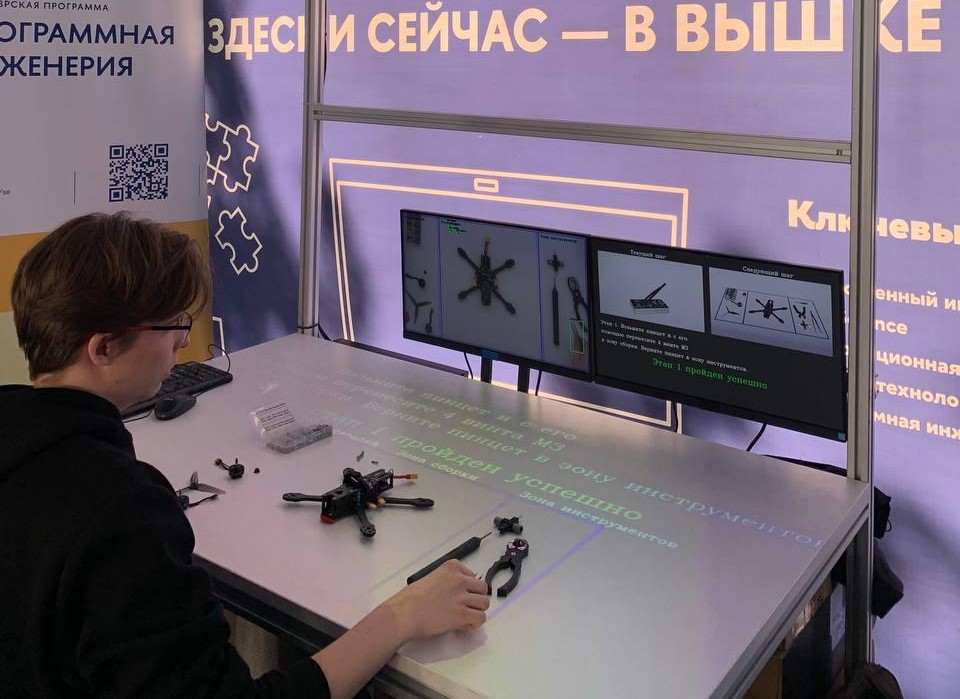
On May 22-24, HSE University presented its developments and degree programmes at the main IT event of the year, the Positive Hack Days International Cyber Fest at Luzhniki. Students and specialists of the Centre for Software Development and Digital Services of the Moscow Institute of Electronics and Mathematics (HSE MIEM), the School of Software Engineering of the Faculty of Computer Science, and the MIEM Workshop for Game Engineering and Interactive Systems together with students from HSE Art and Design School greeted festival guests.
The Positive Hack Days Fest has been held since 2011 and brings together leading experts in the field of information security and modern IT technologies, as well as business and government representatives.
Information Security: Competitions and Games
The international cyber festival aims at popularising the IT field among the young audience. It features master classes on relevant topics, including information security, and lectures for festival guests.
The developments of MIEM and the Faculty of Computer Science were presented to the festival guests at the HSE University tent. The MIEM zone featured recognition and intelligent control of manual operations in industry. Using video surveillance, the system monitors assembly operators’ actions, promptly notifying them of errors and reducing the level of defects. It also ensures compliance with safety regulations and prevents accidents in the workplace. The development has already become the hallmark of the MIEM Centre for Software Development and Digital Services.
During the event MIEM experts presented one of the main educational projects of recent years on cybersecurity for schoolchildren—the Information Security profile of the All-Russian Olympiad of Schoolchildren in Informatics. Associate Professor Anton Sergeev and graduate of the MIEM Department of Cyber-Physical Systems Information Security Anton Fakhretdinov, spoke on the idea of school competitions, providing opportunities for talented young hackers to enrol in the country’s best universities.
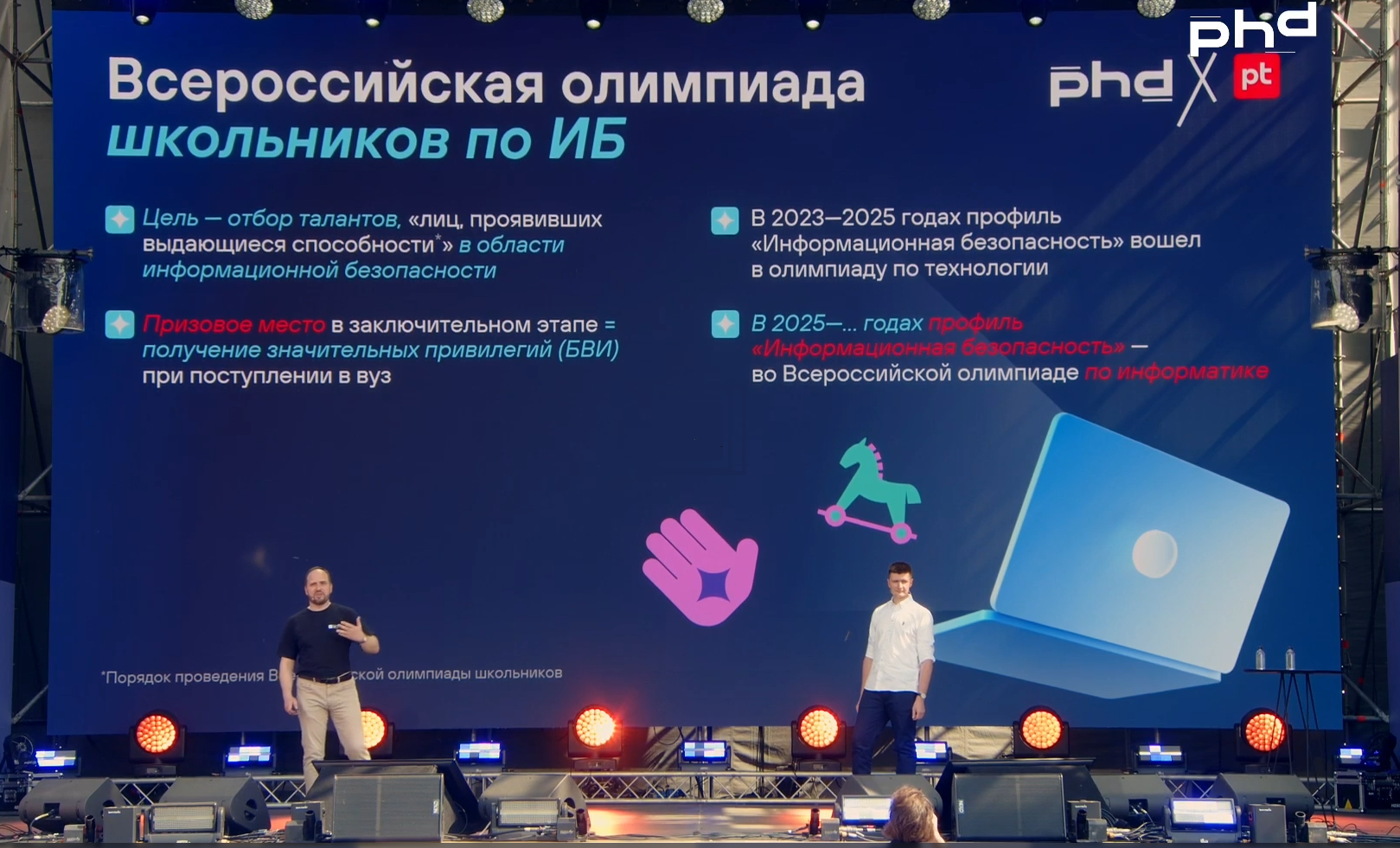
The MIEM team also invited festival participants to play games developed in the indie studio BHS Workshop of Game Engineering and Interactive Systems, as well as acquaint themselves with the Claw Engine created for game development. All games of the workshop were developed to the stage of practical application, which allowed PHDays guests to play them in the game mode.
The Claw Engine is a modern modular computer game development environment that uses generative neural network tools to simplify the process of creating video games. The game engine was developed at MIEM in 2024. More than 80 students took part in its creation. The modular architecture, built-in generative algorithms, and AI support allow users to assemble the game like a constructor.

Ilya Semichasnov
‘The annual Positive Hack Days Fest is not limited to information security. This is a unique platform that allows students to gain practical experience interacting with potential customers by demonstrating their products in real time,’ said Ilya Semichasnov, Academic Supervisor of the Master’s Programme in Digital Engineering for Computer Games. ‘HSE MIEM projects have become a hallmark for such events, which has a positive impact on the development and promotion of the HSE engineering track.’
FCS students also presented their game projects. Tent visitors had the opportunity to learn about the bachelor's degree programmes ‘Information Product Design and Development’ and ‘Game and Digital Product Development,’ as well as the project group on computer game software engineering at FCS. The staff of the FCS Continuing Education Centre spoke about the features of continuing education in the IT field, and those who already work in this field could learn how to build a personal brand and what DevRel is. Experts in this field took part in the Standoff cyber battle, a competition in which participants are invited to solve cases related to information system protections. Vadim Akhmedov, graduate of the Master's Programme ‘Information Security and Artificial Intelligence Technologies,’ was one of the contestants.
Reports and Lectures
In the traditional PRO part of the forum, two reports by MIEM specialists were presented. Oleg Evsyutin, Head of the MIEM Department of Cyber-Physical Systems Information Security, Kristina Dzhanashia, Junior Research Fellow at the Laboratory of the Internet of Things and Cyber-physical Systems, and Anastasia Nesterenko, HSE master’s student in the ‘Information Security and Artificial Intelligence Technologies’ programme, presented the report ‘Digital Watermarks: From Invisible Ink to Generative Models.’
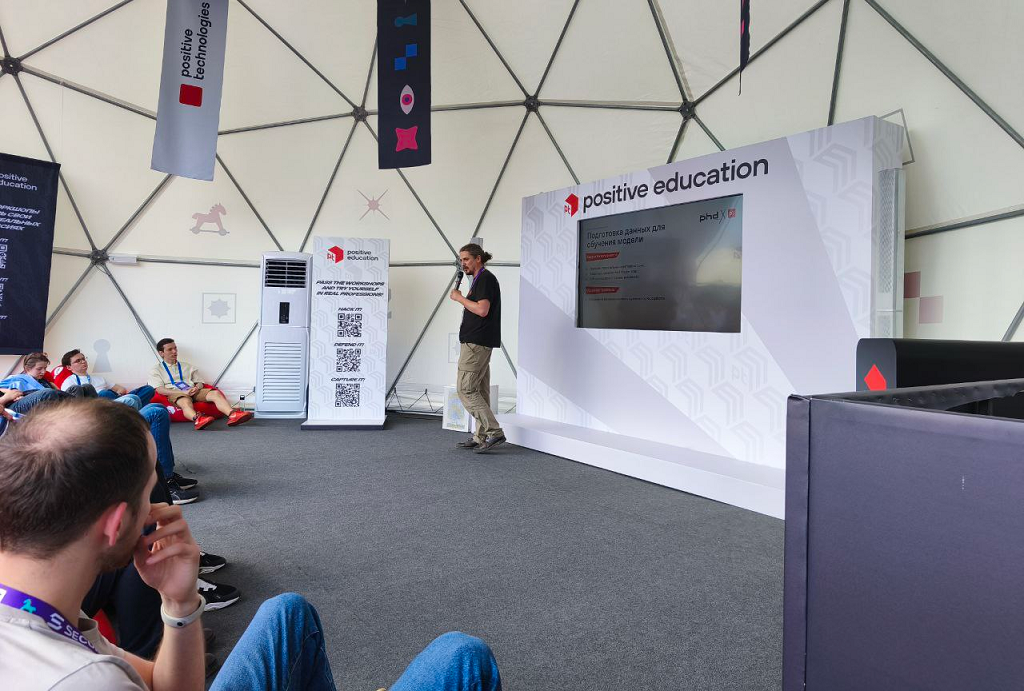
The team of the HSE MIEM Centre for Software Development and Digital Services presented the report ‘How to Save AI: From Data Collection to Production’ dedicated to the security of artificial intelligence and issues of MLSecOps. MIEM researchers Vladimir Bashun, Viktor Minchenkov, Mikhail Shulgin, and Alexey Soldatov conducted a workshop on the key vulnerabilities and attacks on AI models and answered questions from the audience.
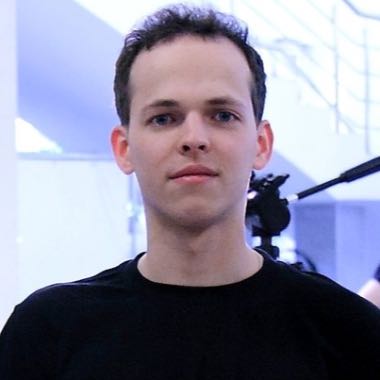
Alexey Soldatov
‘As the organiser of the HSE University site on the part of MIEM, I can't help but note the friendly atmosphere both at the HSE tent and at the event as a whole,’ said Alexey Soldatov, Analyst at the HSE MIEM Centre for Software Development and Digital Services and second-year master’s student in Systems Analysis and Mathematical Technologies. ‘In three days, we managed to interact with specialists in different fields and exchange experiences. It was interesting to listen to lectures by industry leaders who raised topical issues of information security and cyberbullying and actively discussed ways to solve them.’

Olga Maksimenkova
Olga Maksimenkova, Deputy Head of the School of Software Engineering and Head of the Computer Games Software Engineering project group, delivered a lecture on information security of artificial intelligence. During her presentation, she explained what a digital footprint is, what personal data is, and where it can be found or lost. She also discussed how teachers use artificial intelligence in their work and the risks that it may pose.
Admission and Studies

Nikita Smirnov
‘At the HSE tent, we shared information about the university’s educational opportunities, particularly the Faculty of Computer Science and MIEM. The HSE zone also featured games developed by students that guests of the event could play and then participate in a merch raffle,’ said Nikita Smirnov, Lecturer at the School of Software Engineering.
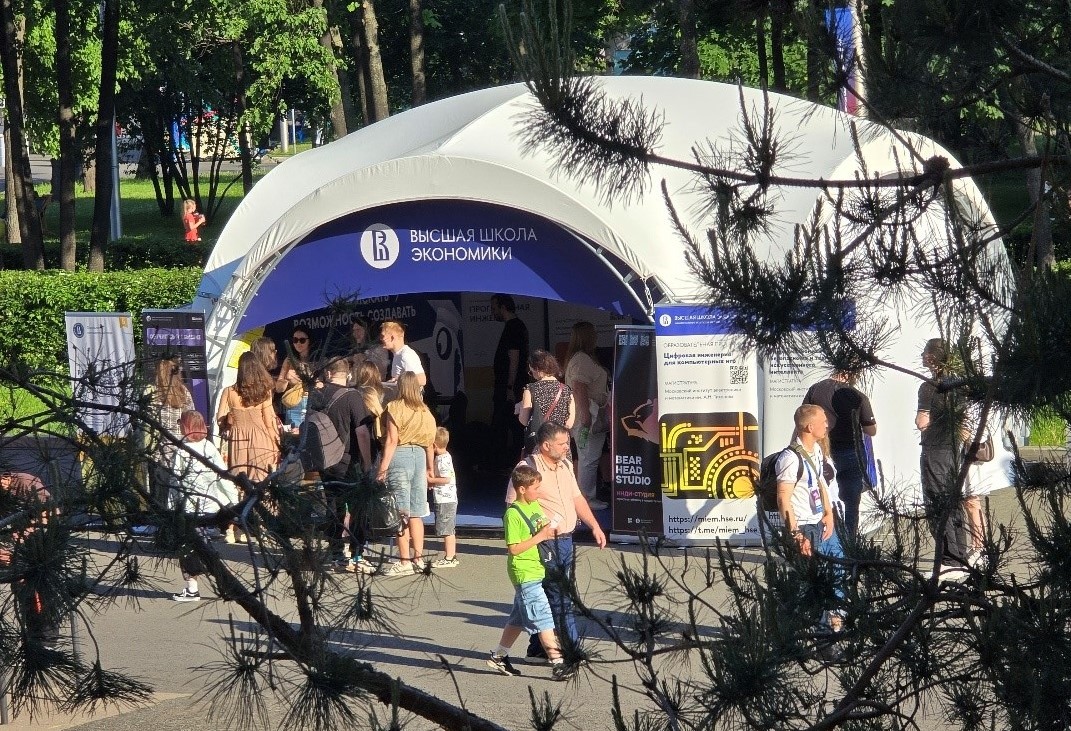
At the cyber festival, Ilya Davydov, first-year student of the Bachelor’s Programme in Information Product Design and Development, told the guests about the areas of study implemented at the university.
Alina Pakhomova, event and special projects manager at the FCS Continuing Education Centre, said that the team’s goal at PHDays was to prove that it’s possible to study at any age, whether you’re a school student, a university student, or someone who has worked in your field for a long time. ‘We talked a lot about education and discussed how important it is to enhance digital competencies of employees, especially in the era of active AI use,’ said Alina Pakhomova. ‘It was great to see that so many people at the festival were interested in continuing their education, asking about master’s degrees, vocational education, and corporate programmes.’
See also:
HSE Faculty of Computer Science Holds 3rd Winter School in Software Engineering
For the third time, HSE University Faculty of Computer Science has held a winter school in software engineering, with over 1000 participants registering for the event. Representatives from the Faculty of Computer Science and its partner companies, including Yandex, Sber, Tinkoff, and MTS, delivered lectures at the school.
‘This Is a New Chapter in My Career and I Want to Write It in a Cool Manner’
In the 2023/24 academic year, the Bachelor’s programme in Software Engineering at HSE University’s Faculty of Computer Science has a new academic supervisor. Nikolay Pavlochev has experience in successfully implementing initiatives for the development of the Moscow Institute of Physics and Technology (MIPT). At Acronis, a company working in the field of backup and data recovery protection systems, he has worked with leading technical universities in Singapore, Switzerland, Germany, Bulgaria, and the USA. In our interview, he spoke about how he came to the Faculty of Computer Science and what his programme development strategy is.
HSE Faculty of Computer Science Holds Summer School on Software Engineering
At the beginning of July, a summer school on software engineering was held at the HSE Faculty of Computer Science. This is the successor to the school on mobile applications development, which was held at the FCS from 2015 to 2022. The school’s partners for this event included 1C, Sber, the community of authors of the Indicator games, and the Samsung Innovation Campus IT School.
HSE Faculty of Computer Science Holds Second Winter School on Software Engineering
This year, 625 applications from 90 cities were submitted to participate in the second Winter School on Software Engineering at the HSE Faculty of Computer Science. The main topics were software architecture, mobile development, digital twins, artificial intelligence, cloud services development, API, technical debt, QA, software systems, Flutter, and distributed systems.
‘When I Learned to Implement My Ideas in a Program, I Understood Why It Was Worth Coming to University’
On February 15–17, the HSE University Faculty of Computer Science will hold a winter software engineering school aimed at sharing and exchanging knowledge about modern tools and methods in software development. Those interested in taking part must register by February 12. The HSE News Service spoke to students of the Faculty of Computer Science about their studies on the Bachelor’s programme in Software Engineering.
HSE Faculty of Computer Science Organises Its First Software Engineering Winter School
From February 14–18, the HSE Faculty of Computer Science organised its first international winter school dedicated to software engineering. The event was supported by JetBrains, Innopolis University, and Schaffhausen Institute of Technology.
'Programming Is an Ideal Profession and There’s No Better Time for It Than Now’
Ernest Sadykov, a graduate of the HSE Faculty of Computer Science (FCS), works as a software engineer at Facebook. In this interview, he tells Success Builder how an extrovert can be a 'techie', why companies have trouble finding IT specialists and what Facebook’s philosophy is.
Bachelor's Programme in Software Engineering Receives Prestigious International Accreditation
The high quality of HSE’s Bachelor programme has been recognised by experts on the Accreditation Board for Engineering and Technology (ABET), the headquarters of which are located in the U.S. For more than 85 years, ABET has been accrediting college and university programmes in the applied and natural sciences, computing, engineering and engineering technology. HSE’s Software Engineering programme is the only one in Russia to have received this accreditation.
'The Best Experience of My Life'
HSE is becoming more and more popular among foreign students. We talked to English speaking graduates of the English-taught Master’s programme System and Software Engineering and found out about their experience of studying in HSE, life in Moscow, and what do they do as professionals now.
Studying Software Engineering at HSE
The Master’s programme in System and Software Engineering aims to provide students an opportunity not only to acquire the knowledge and experience they need in their chosen profession, but also to help them generate a systemic view on bringing resolutions to the difficult professional challenges they are certain to face in the future. Academic Supervisor Dmitry Alexandrov talks about programme features and international students share their experience of living and studying in Moscow.


